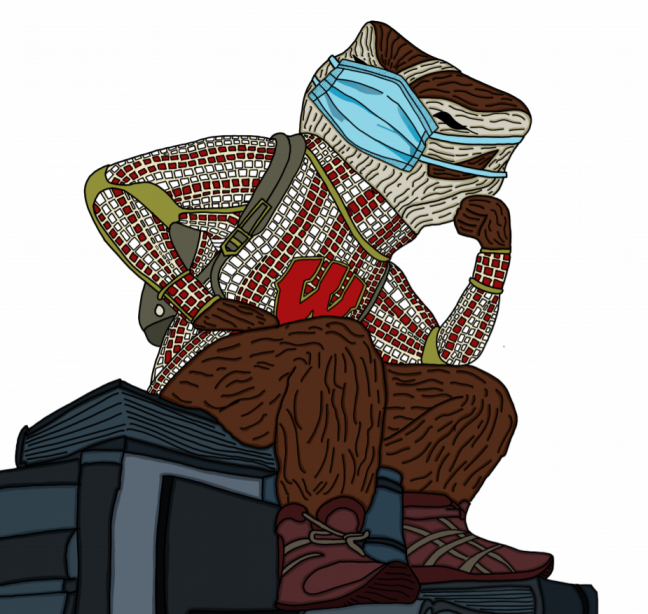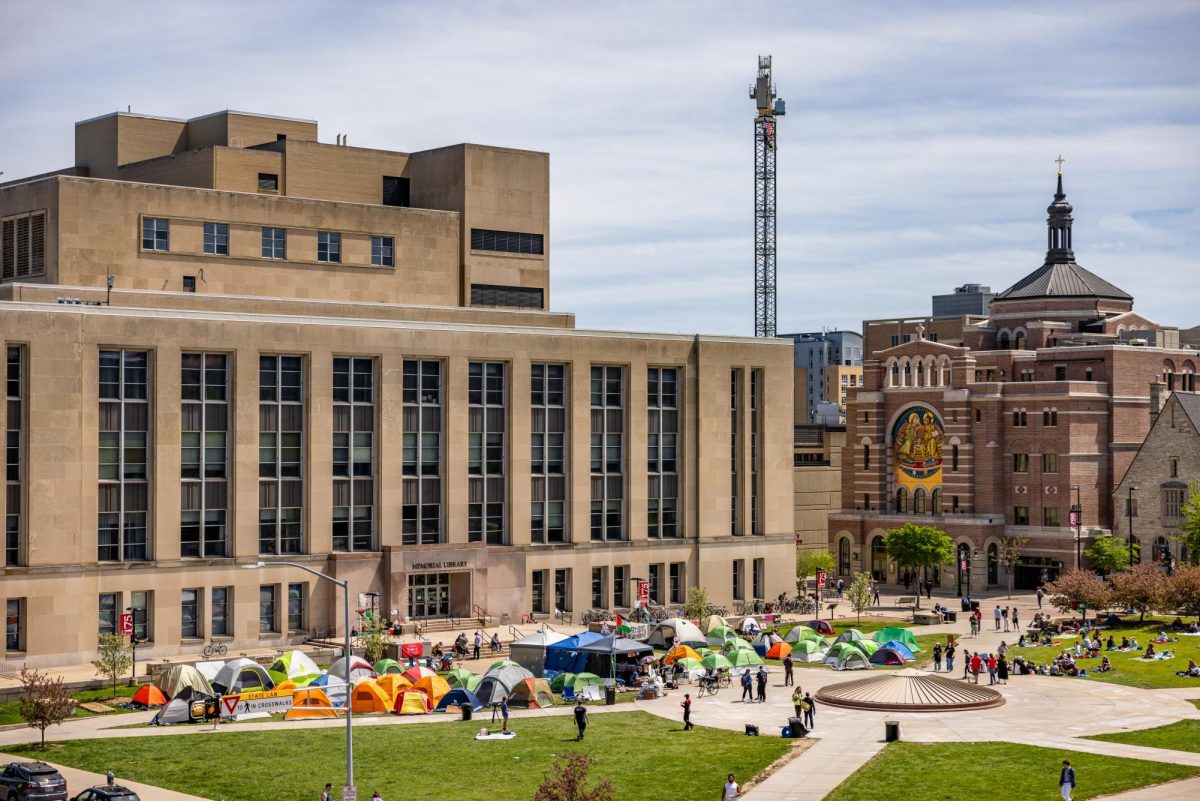In the past few months, much of the college experience has been reduced to watching. Watching Netflix, watching online lectures and watching higher education rapidly change. By the time this story is to be published, the University of Wisconsin is set to begin the Fall 2020 semester, guided by the Smart Restart plan to safely bring students back to campus to continue their degrees amidst a global pandemic.
Just weeks earlier, however, UW students and the rest of the world watched peer institutions attempt to do the same.
The University of North Carolina at Chapel Hill abruptly shifted all undergraduate courses to remote instruction as several students became infected a week after beginning in-person classes. Syracuse University and Purdue University suspended students for attending large gatherings in violation of each institution’s campus health guidelines. The University of Notre Dame closed public spaces and moved classes online to stop the spread of the virus — their student newspaper begged their peers — “Don’t make us write obituaries.” And while New York University students lamented their meager quarantine meals on TikTok, Michigan State University canceled classes before they even began.
UW has not experienced any of these struggles yet, but as UW students watch peers at other institutions struggle to navigate college and avoid falling ill, it’s easy for students to wonder, “What if that was me?”
UW students who have tested positive and recovered from COVID-19 know the answer to this question, even as they continue to navigate an uncertain future.
Let’s Get Physical
The five students interviewed for this story are in no way a representative sample of possible COVID-19 experiences, severity or side effects. According to the World Health Organization, 80% of COVID-19 infections are mild or asymptomatic. If this sample were representative, one of these students would have suffered a severe case of COVID-19 — yet, all five said they had mild cases.
Senior Hallie Butterer thought she had a cold. Her roommate, Alissa, who requested to be addressed by her first name only, was tested because she had a known contact. She did not experience symptoms until a few days into isolation.
“Basically, I was asymptomatic,” Alissa said. “I had some chest pain, and like, a sniffle.”
Butterer’s symptoms — similar to a cold, complete with sinus pain and headaches — evolved into chest pains days into her isolation.
“It kind of felt like someone was sitting on your chest all day long,” Butterer said. “And then I lost my sense of smell and taste. But that was the extent of my symptoms.”
According to research by Vanderbilt University Medical Center, up to 80% of people who test positive for COVID-19 complain of losing their sense of smell or taste. In fact, a recent study based on retrospective data indicated those who have a normal smell function during COVID-19 were more likely to be hospitalized and placed on a ventilator. Only two students interviewed reported losing smell and taste.
UW senior Courtney Degen said she was frustrated by the loss of those senses. Degen experienced a consistent sore throat, headaches and congestion, and reported feeling sick to the point she couldn’t get out of bed and needed frequent naps for a few days.
“I think for me, the biggest thing was loss of taste and smell. That’s something I’ve really never experienced before,” Degen said. “I could not even smell perfume if I sprayed it on my hand. It was crazy. And that was really frustrating. Everything I ate just tasted like mush.”
COVID-19 can cause a wide range of symptoms, the most common being fever, dry cough and fatigue. As scientists learn more about COVID-19, however, they’ve discovered less common symptoms. COVID-19 may cause gastrointestinal issues. These symptoms may be precursors to more common symptoms, like fever and respiratory issues, according to Mayo Clinic.
UW senior Genessi Bryant experienced unusual symptoms like nausea and loss of appetite. These symptoms are present in less than 10% of those who test positive for COVID-19, according to a meta-analysis published in the medical journal Gastroenterology. Though these symptoms came and went, Bryant is still experiencing some symptoms long after her COVID-19 diagnosis.
“I’ve only tried to work out, I want to say like three times and I usually do HIIT workouts,” Bryant said. “And I definitely felt the effects — like the respiratory effects — even when I’m going up the five flights of stairs to my apartment.”
Bryant is not alone. A recent report by the Centers for Disease Control and Prevention found that 35% of individuals who had COVID-19 and self-treated their symptoms were not at their usual level of health within two or three weeks after testing. For people ages 18 to 34 with no underlying health issues, 20% still felt symptoms weeks after testing.
In late June, Vice President Mike Pence said it was “a good thing” around half of the new COVID-19 cases in America were young adults because they were less at risk of becoming severely ill than older people. But recent medical research and anecdotal evidence suggest mild COVID-19 cases can still bring on long-term side effects, even in young people without underlying health issues.
“It’s almost like a blow to your ego to be in your 20s and healthy and active, and get hit with this thing and think you’re going to get better and you’re going to be OK. And then have it really not pan out that way,” said Fiona Lowenstein, a COVID-19 survivor, in an interview with The Guardian.
A Pandemic Mentality
The mental health epidemic among college students is nothing new, but just like many other societal issues, COVID-19 has exacerbated its negative effects. Several studies have shown a connection between social isolation and loneliness to poor mental and physical health. The widespread experience of loneliness is associated with a reduced lifespan and a higher risk of mental and physical illnesses.
Research on the psychological effects of quarantine during other past disease outbreaks, such as China’s quarantine during the SARS outbreak in 2003 and the ebola outbreak in many west African countries in 2014 finds quarantines may correlate to mental health downturns.
Butterer said she felt anxious and frustrated during the first four days of her isolation, until her roommate, Alissa, tested positive and returned to the apartment to quarantine with her. Though she wasn’t completely alone during her illness, Butterer was still anxious.
“I did have a lot of anxiety knowing that I had it because it’s pretty scary to look on the news when the news is saying ‘This many people have died and these people are on ventilators,’” Butterer said. “Knowing that I had [coronavirus] made me really, really nervous even though I knew I was going to be fine. But just looking at the news and it saying there were 130,000 coronavirus deaths — I’m like ‘oh my god, that could be me.’ That was a little frightening and scary for me.”
The anxiety in those with COVID-19 is often paired with guilt. Many feel guilty for having such mild symptoms while others have severe cases, while some, like Butterer and Alissa, felt guilty for potentially exposing their family, friends and other acquaintances to the disease.
Degen lived this reality — her sister was the first in her immediate family to test positive for COVID-19, and she and her father tested positive soon after. Though she did not test for COVID-19 when the rest of her family did, Degen’s mother spent a few days in the hospital after having trouble breathing — she eventually tested positive. She recovered, though she still grapples with frustration surrounding the disease.
“It is difficult for me to wrap my head around the fact people don’t believe the virus is real or don’t understand the extent of the virus and how dangerous it really is,” Degen said. “[Coronavirus] may be hard to wrap your head around until you’ve experienced it. But having seen my mom go to the hospital over this, it’s really difficult for me to understand how people can be so selfish and misinformed about the situation.”
Though negative mental health effects during COVID-19 are common, Bryant maintained a positive attitude during her illness. As a self-described extrovert, Bryant did struggle with the isolation period, but found the extended time alone good for personal and spiritual growth and connecting with family via FaceTime. Bryant said it was nice to be forced to calm down and be alone with herself to engage in self-reflection.
Director of Marketing and Health Communications at University Health Services Marlena Holden said UHS is still fully operational to meet the mental health needs of all students, whether they have COVID-19 or not.
“We are still planning on providing all of the same services, it’s just going to look different,” Holden said. “So for example, in mental health services, they were able to pivot quickly this spring to provide all tele-mental health services. And we were able to meet about 80% of the same demand the same time last year. And we will continue that in the fall.”
Recent graduate Kara Erickson advised students allow themselves to mourn the experiences they lose throughout the pandemic, though they may seem small compared to the greater problems the pandemic has caused. And though so much is changing, there is still fun to be had.
Erickson said the at-home graduation her roommates threw her was more special than a regular commencement and suggested students still find ways to celebrate safely.
“It’s totally valid to mourn some of the things that you’re losing during this time,” Erickson said. “Try to adapt as much as you can and be creative in the ways you celebrate birthdays or graduation.”
So, What Now?
Recovering from COVID-19 is a task within itself. After that, of course, comes the constant adaptation of navigating college during a global pandemic. For nearly all students, this semester will look profoundly different.
Just as students watch higher education change, recent and soon-to-be graduates watch the job market rise, fall and evolve. For Erickson, the coming months will consist of searching for a job in the nonprofit sector.
According to a report from Johns Hopkins University, the nonprofit sector lost more than 1.6 million jobs from March through May — equivalent to 13% of all nonprofit jobs in America. Erickson’s primary interest is working with youth arts programming, but she understands the large toll COVID-19 has taken on the industry.
“I feel bad applying for jobs in the nonprofit world right now. I feel like I should be volunteering my time rather than looking for a paid position on a lot of these places,” Erickson said. “It would be awesome to get a paid position there. But it’s just such a year. It’s just a weird thing to be like ‘Things are terrible, but do you need another worker?’”
For students whose education depends on fieldwork, the upcoming academic year remains in limbo as well. Butterer, who is in her final year of studying for a Bachelor of Social Work degree, will fulfill her field placement online. Though she will be working with a real social work agency, she will assist clients virtually.
Butterer said her agency seemed prepared to meet the needs of clients virtually. But, she is still concerned about the learning curve she may face in trying to get to know her clients, getting them the services they need, all while trying to keep everyone safe by conducting her fieldwork online.
Bryant is still waiting for information on her practicum with the School of Education. Education majors need a full semester of student teaching before licensure — but whether that semester will be online or in-person remains to be seen, especially when dealing with different school districts. Still, Bryant seemed fairly optimistic about the School of Education’s handling of the situation.
“Their main goal is to get us licensed and graduated on time,” Bryant said. “I’m OK with just sitting here and waiting for it. They’re trying to move so many pieces at a time … there’s just so many little cogs to this clock.”
Not all students are as understanding. At least 100 lawsuits have been filed against multiple colleges and universities as students demand refunds after schools pivoted to remote learning at the beginning of the pandemic. Several UW students have called for a reduction in tuition because they believe online learning is not as valuable as in-person instruction.
The Teaching Assistants’ Association, the graduate student union on campus, advocates for lowering the cost of tuition for the duration of the pandemic, in line with lower operating costs, since fewer students are on campus. They also advocate for the abolition of mandatory fees for students because many resources on campus, like the Wisconsin Unions or recreation centers, are reduced or inaccessible to students. Degen, though an undergraduate student, feels similarly.
“It’s hard because I understand that students want to go back to campus and campus, to some extent, needs to open to make money,” Degen said. “But at the same time, I think [UW] really needs to weigh those options and think about what’s the safest option, not what’s going to save you the most money.”
The coronavirus pandemic will continue to irrevocably change higher education for the foreseeable future. As UW students begin a semester like no other, many fear getting sick, while others mourn the in-person interactions that make the UW experience what it is.
Still, others remain hopeful.
“It’s all about finding the silver lining in every day, but taking it day by day,” Bryant said. “That’s probably the best thing [to do].”















